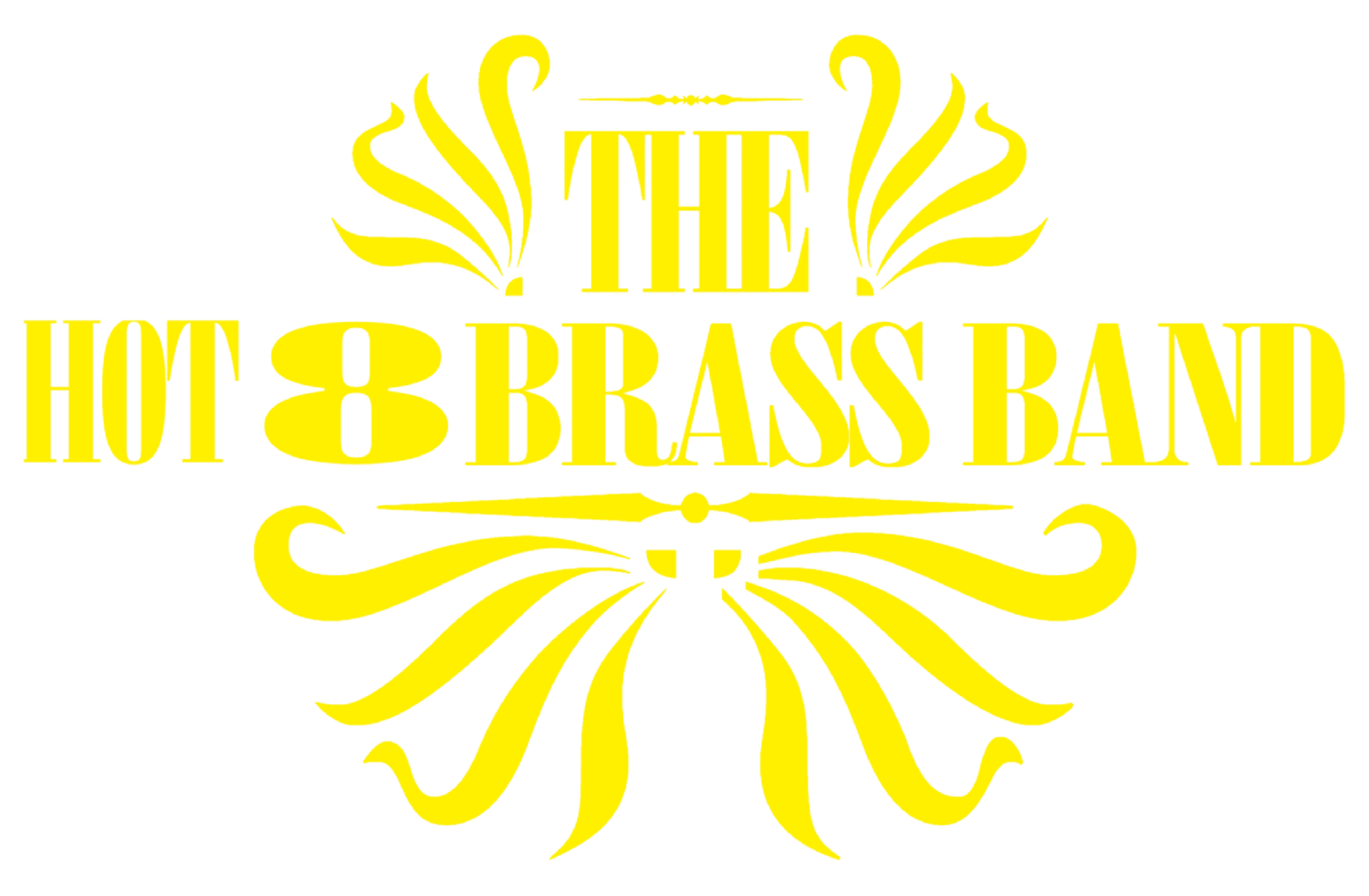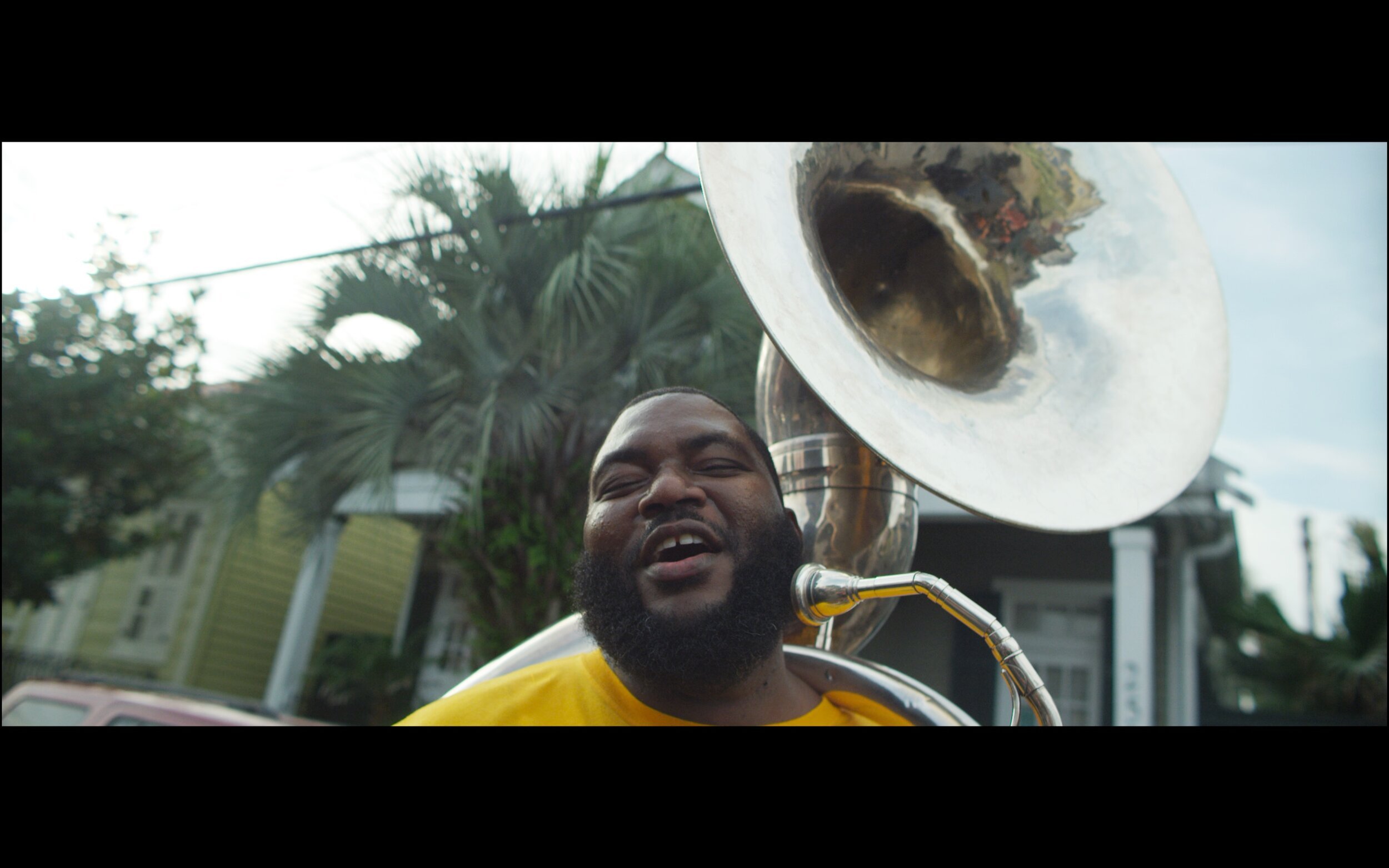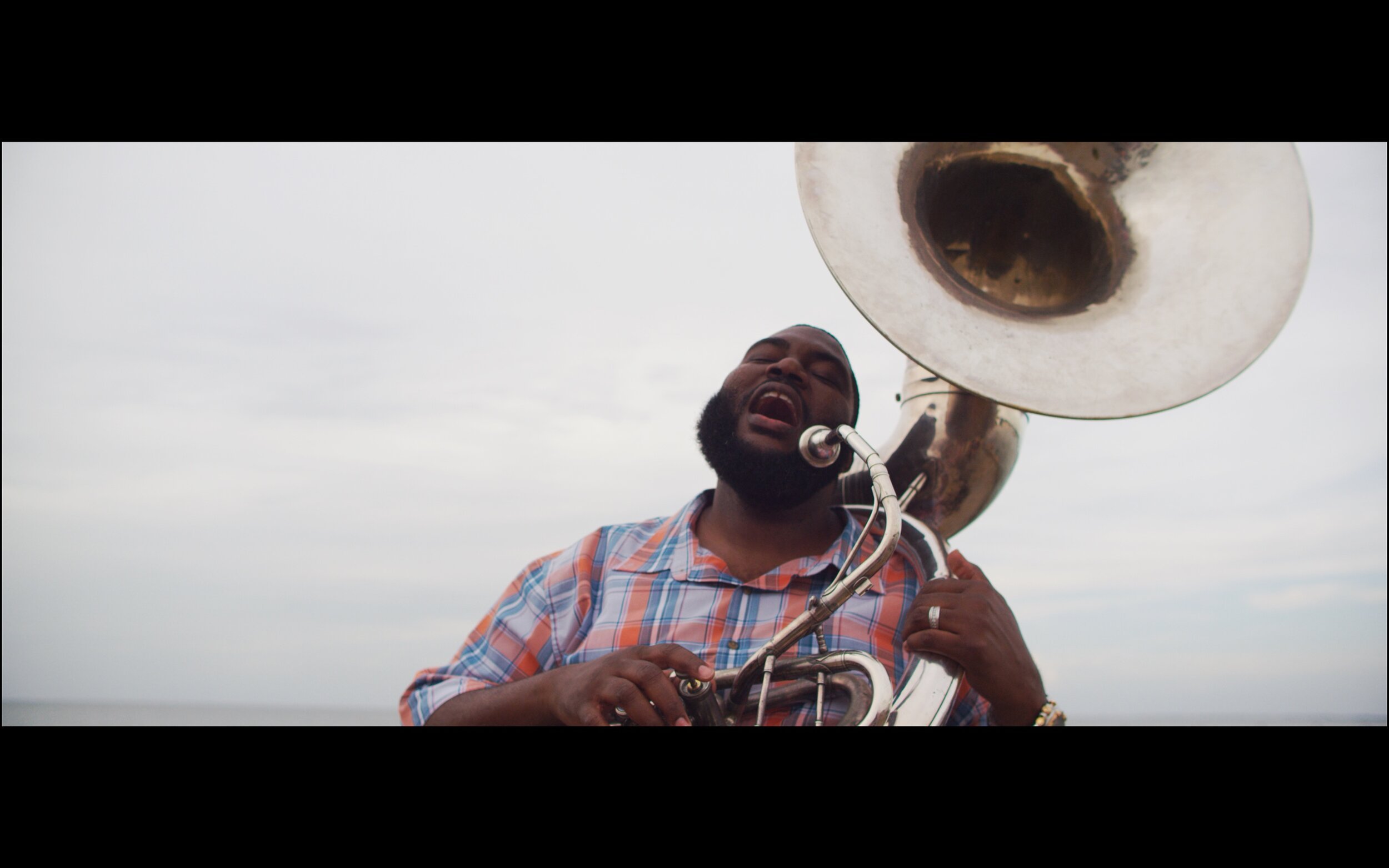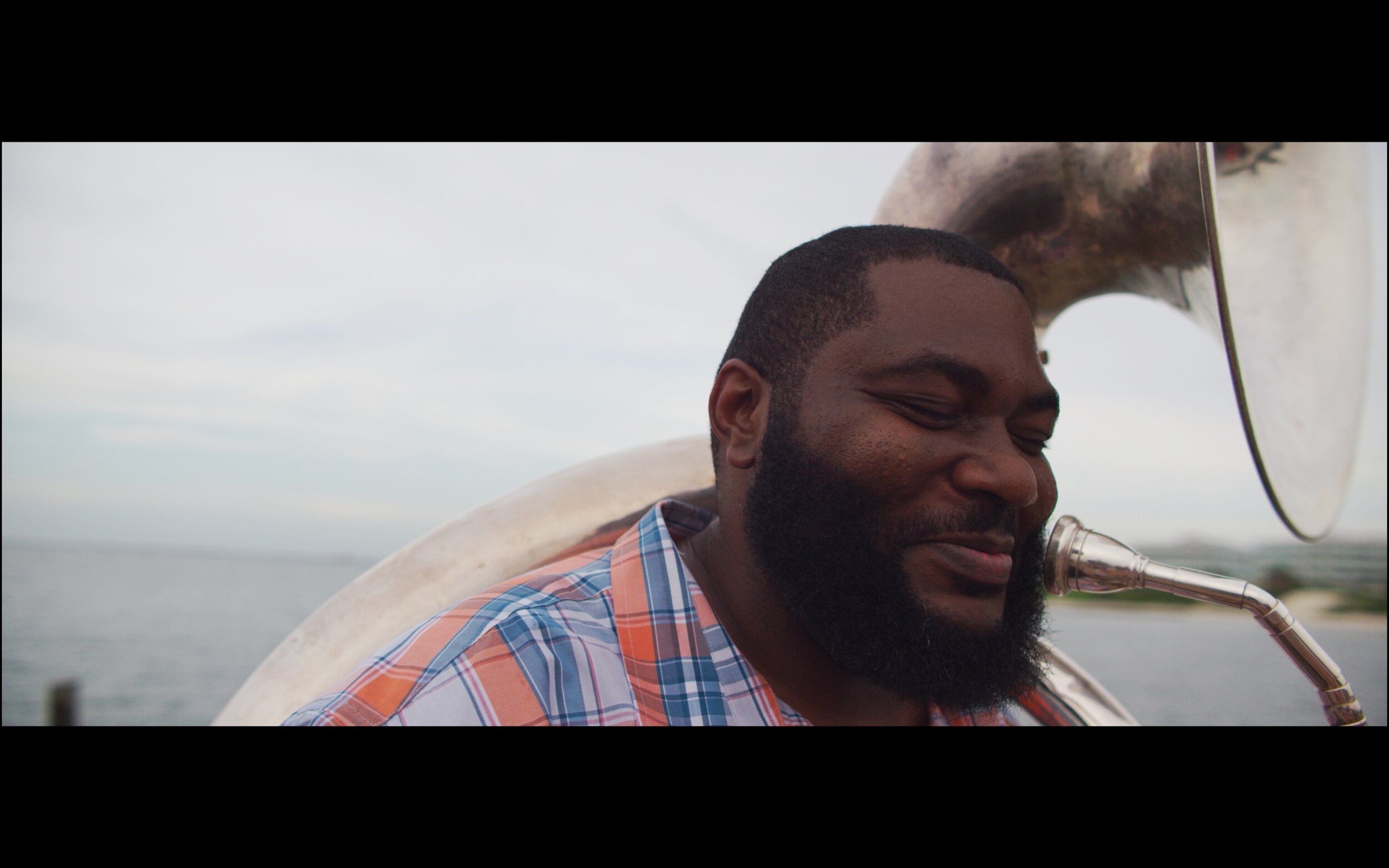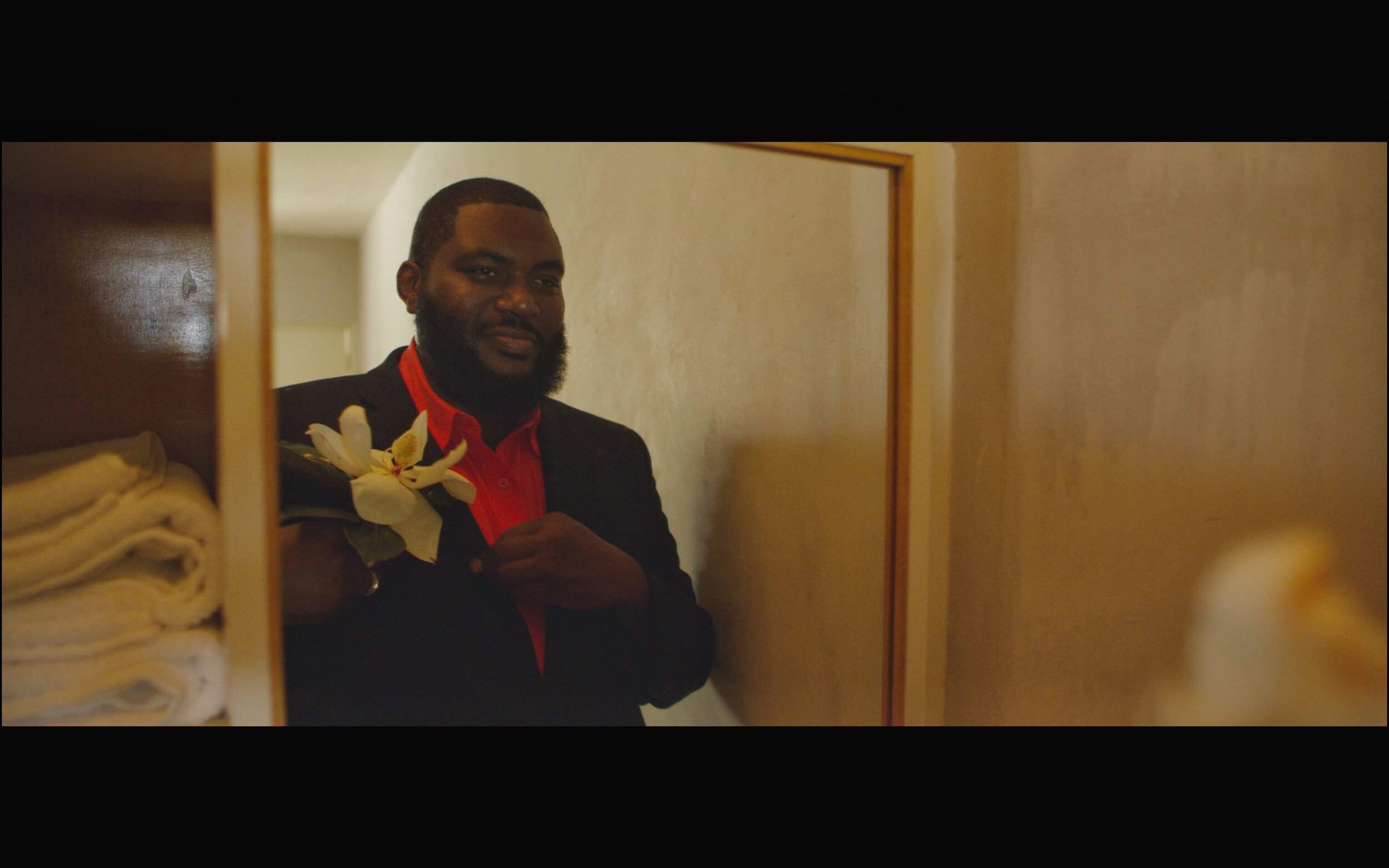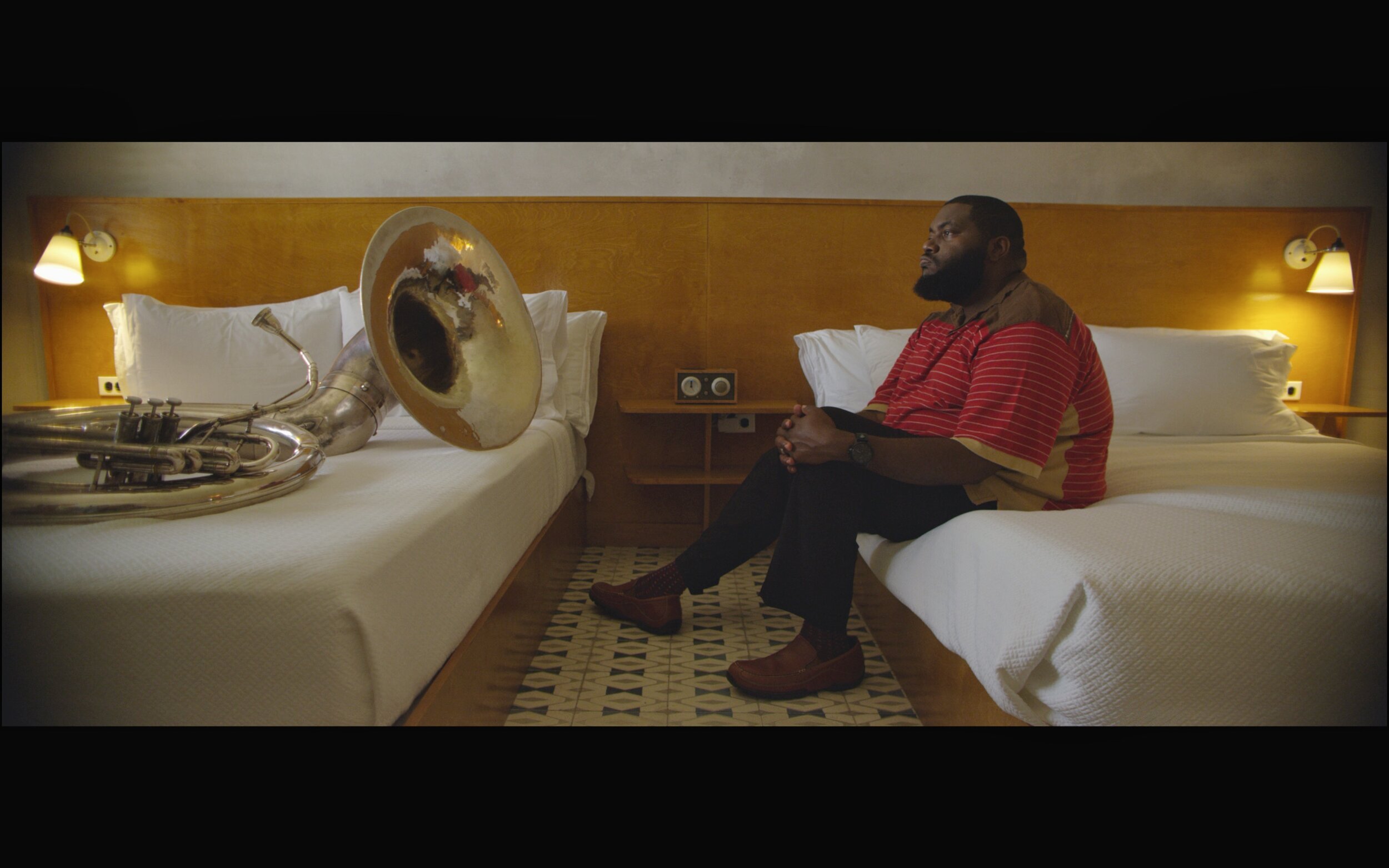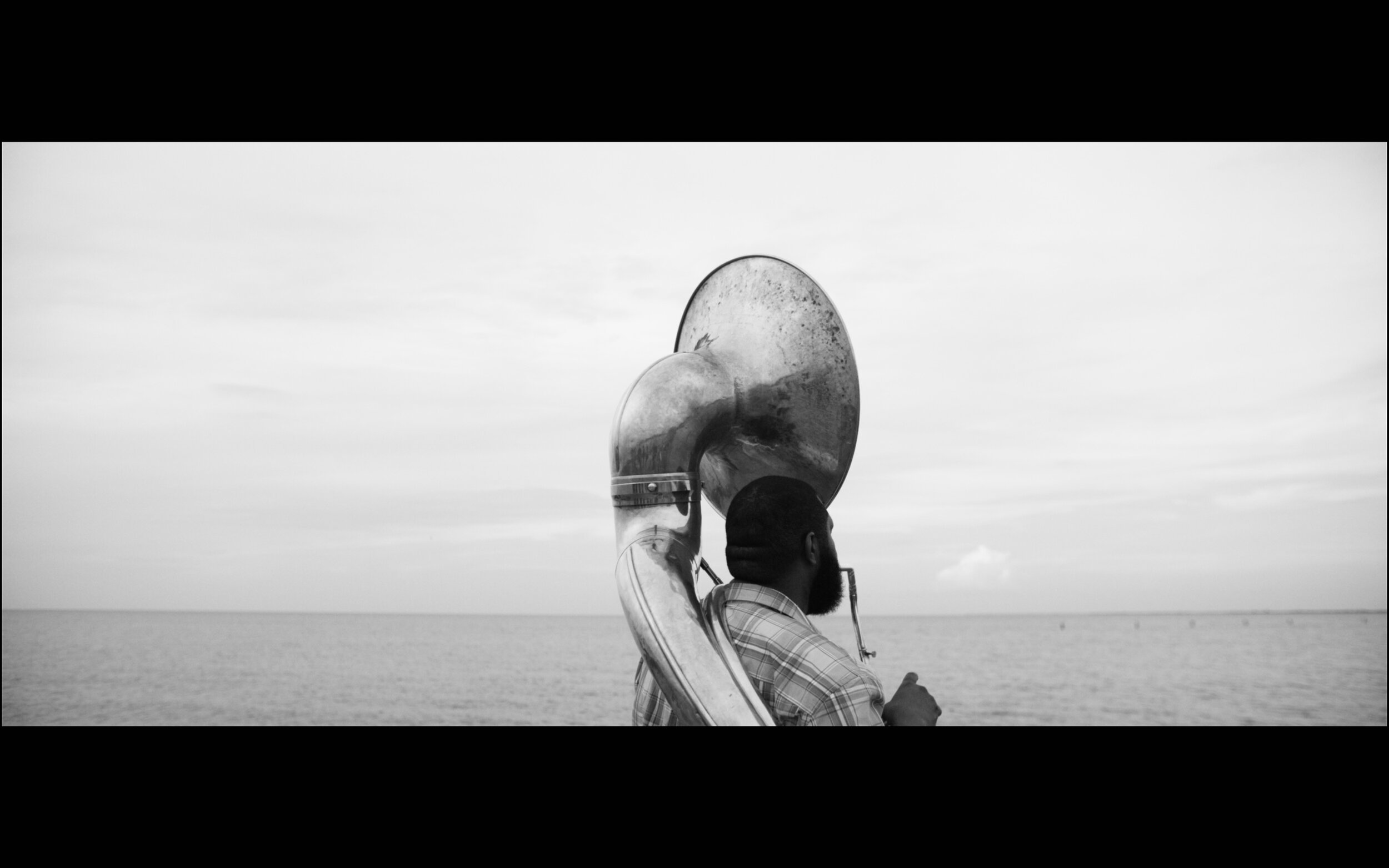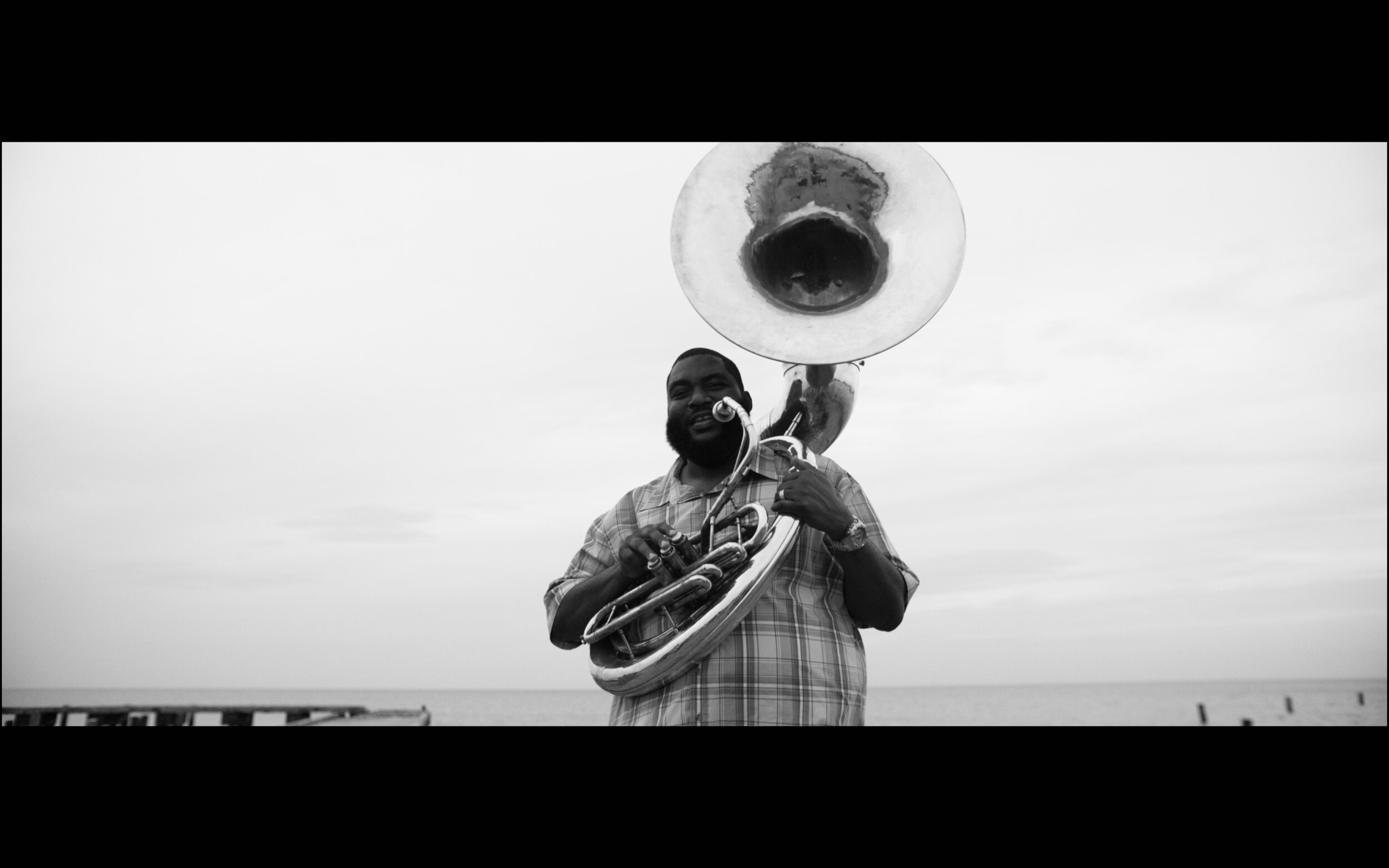By Dr Michael White, 2015
For over 20 years one of the most popular and visible funk-style brass bands in community parades and funerals has been the Hot 8 Brass Band. In 1996 sousaphone player Bennie Pete was instrumental in merging two former Fortier High School student groups, the High Steppers and the Looney Tunes Brass Bands, to form the Hot 8. The players grew up together and maintain strong, family-like bonds and regular membership. Most of them were born between 1975 and ’87 in a generation that grew up hearing mainly modern-style brass bands in community functions. The band can be larger than many younger groups often featuring ten members, including three trumpets, three trombones, tuba, bass drum, and snare drum. As is common among some more modern groups, the Hot 8 uses only one reed player and like most of the younger bands, the Hot 8’s funk style is a blend of influences from the Dirty Dozen and Rebirth, with more elements of contemporary r&b, rap, and its local variation, “bounce.” The uniqueness of their sound is mainly due to a steady stream of creative original songs and ideas composed or introduced by various band members. Since the Dirty Dozen, the sousaphone has had a more prominent role in brass bands as a feature and solo instrument; it frequently sets up and maintains short rhythmic (often melodic) grooves that dominate and propel most songs in the band.
The story of the Hot 8 Brass Band has been one of tragedy and triumph. Over the years the Hot 8’s ranks have been decimated by the deaths of four original members due to street violence and illness. Hurricane Katrina was a life-altering turning point; after being evacuated, displaced, and scattered across the country, the band regrouped and began touring the United States to encourage and support other displaced Katrina victims and promote New Orleans’ recovery. After also performing abroad, they opened on tour for popular r&b singer Lauren Hill for six months. The Hot 8 was featured in two Spike Lee documentaries, When the Levees Broke (2006) and If God Is Willing and Da Creek Don’t Rise (2010), bringing them a measure of national exposure that has helped to fuel a steady touring schedule. The band has recorded two of its own CDs and one with the Blind Boys of Alabama. In 2012 the band put out an autobiographical CD, Life and Times of the Hot 8, and a music video over the backdrop of a Katrina-damaged city, Ghost Town.
Long-term displacement across the country helped members of the band realize just how unique and special New Orleans culture is, which in turn inspired their desire to learn more about the history, sound, and style of earlier brass bands. Hot 8 manager Lee Arnold and leader Bennie Pete approached me about doing a series of workshops with the band; we watched videos, listened to recordings, talked, and rehearsed. The result was a series of concerts in which the band included traditional songs and explored long-forgotten concepts like three-part trumpet harmonies and volume shifts. A continuous fraternal relationship between the Hot 8 and me has led to some members playing on traditional gigs. Our early collaborations were re-created in a segment featured in the third season of HBO’s series Treme, in 2012.
Remembering our fallen band members...
Bennie Pete 1976-2021
For New York Times obituary please click here or download here. For Rolling Stone obituary please go here or download here.
On September 6. 2021, we the Hot 8 Brass Band lost our beloved bandleader, Bennie Pete. He was more than just our leader; he was a constant galvanizing force within our own family of fellow musicians and beyond. Bennie was a rock in our lives. Yes, he was a leader, a teacher, and a mentor. More than that, Bennie was an inspiration to our band and to many other musicians, and the entire musical and cultural community. He helped each and every one of us, from our horn players to the folks dancing in the second lines and to the entire New Orleans community, during the most difficult and darkest times. Bennie helped all of us endure, to heal by encouraging us to continuing to play our music despite any adversities.
After Hurricane Katrina and the failure of the federal levees, Bennie emerged as a symbol of perseverance and hope for all of New Orleans. His commitment to ensuring the cultural continuity of New Orleans’s most authentic, unique and deeply rooted cultural traditions, rituals and practices was unwavering. Bennie’s greatest wish was that New Orleans culture live on for future generations, and that the brass tradition continue to be a model of strength and a barometer of a healthy New Orleans cultural ecosystem.
We will miss Bennie greatly. No words can really do justice about the way we feel about losing our giant leader. But, we will continue to honor his legacy by playing music, taking it to the streets, and bringing hope and joy to all of those who are lucky enough to be part of what makes our city so special.
Bennie died early on Monday at New Orleans East Hospital of complications of COVID-19, after a week of intense ICU care and ventilation that was complicated by multi-organ system sarcoidosis predominantly effecting Bennie’s heart and nervous system. Bennie was 45 years old.
Quotes about Bennie Pete:
Dr. Michael White
”Bennie Pete was much more than a just a great tuba player in a great brass band. He was also a visionary, wise beyond his years. Along with the Hot 8 Brass Band, he remained an important bridge between the New Orleans African American underground second line community and the outer world. His mammoth physical size paled in comparison to the hugely profound reflections that he softly uttered in interviews, on panels, and in casual conversations. As much as Bennie and the Hot 8 accomplished, its seems that his vast potential was not close to being fully realized. His ever-inquisitive nature and ability to remain positive, to continue growing, and to move forward in the face of the most difficult tragedies show the depth of this special human being. While this is an extremely difficult time for Bennie’s family and all of us who knew and loved him, his leadership, wisdom, positivity, and great music will continue to vibrate as great examples for us and future generations to be proud of and learn from.”
Bennie’s physicians Matthew R. Lammi and Lesley Ann Saketkoo
of New Orlean’s Sarcoidosis Center at UMC provided a joint statement: “We are heartbroken and devasted to have lost this beautiful tender soul at 45. Bennie died early on Monday at New Orleans East Hospital of complications of COVID-19, after a week of intense ICU care and ventilation that was complicated by multi-organ system sarcoidosis predominantly effecting Bennie’s heart and nervous system. Sarcoidosis is a condition of inflammatory cells that aggregate in and can disrupt the function of any vital organ system. Black Americans are at higher risk of worse sarcoidosis health outcomes, and Bennie was a tremendous advocate in raising awareness of early detection and treatment that could prevent death and disability from sarcoidosis in the Black community and all people."
Larry Blumenfeld, writing in The Wall Street Journal:
“The rippling authority of founder Bennie Pete’s sousaphone established the Hot 8 as a dominant force on New Orleans streets—the band you want to dance behind during a Sunday second-line parade… He captures both the edginess and transcendent beauty of life in its city.”
Roger Lewis, Dirty Dozen Brass Band:
"I had the pleasure of playing music with Benny, he was the anchor of the hot eight brass band great musician beautiful human being. He is going to be miss another brother going to glory my condolences go out to his family and bandmembers"
Craig Charles BBC Radio 2 presenter:
"When Bennie hugged me I nearly ran out of breath. He just kept on hugging. He had so much love to give. I shared a golf buggy with him once and we had to take him off the back and put him in the middle because the buggy was doing wheelies and couldn’t get the traction. Bennie just laughed and blamed it on the tuba.He made me feel special because someone so cool kind of liked me. And when you get that feeling, the hug that keeps on hugging.Your heart does paradiddles. Hearts just breaking a bit today"
Dinerral Shavers
"Why?" NOPD's shooting death of a young trombone player leaves onlookers and bandmates shocked and in search of answers.
As the Hot 8 brass band makes its last turn of the night back onto Delery Street, a lone streetlight creates long shadows that fall in front of the band, jumping and twisting and leading them home. The band is playing a second line in the Lower Ninth Ward, where -- until earlier this month -- Hot 8 trombonist Joe Williams lived with his sister and her family. "We'll be playing every night until they put him in the ground," says bass drummer Harry Cook. It's the traditional sendoff for a fallen musician -- nightly second-line parades leading up to the day of the funeral. The band veers off the street into a big corner yard, where a barbecue grill exhales clouds of meaty smoke and older relatives watch from the side doorway. Lit by that door's single light, the musicians face the family and launch into the traditional jazz tune "Bye and Bye." READ FULL ARTICLE HERE
Seven months after his murder, Dinerral Shavers' family struggles to cope. By Michelle J. Nealy
Dinerral Shavers Jr. wakes up most days and puts on one of his four memorial T-shirts, emblazoned with his father's face and snare drum, underneath his regular shirt. Explaining the ritual one day, the 7-year-old boy told his mother: "I want to keep my dad close to my heart." Short for his age at just 4 feet tall, his small frame and casual grin make the boy easy to spoil, especially now that his father is gone. Dinerral Shavers Sr., a 25-year-old band teacher and member of the Hot 8 Brass Band, was slain in December in a killing that helped galvanize New Orleanians for an anti-crime March on City Hall. DJ, as his family calls him, finds his own ways to cope, at times with animated remembrances of his father, other times withdrawing into his own quiet cocoon. READ FULL ARTICLE HERE
More memories, texts and videos of Dinerral you can find here
For NPR radio segment about Dinerral please see here or play below.
Jacob Johnson
In 1996, trumpet player Jacob Johnson was murdered in a home invasion. He was 17 years old.
Demond Dorsey
In 2004, trombonist Demond Dorsey died of a heart attack at the age of 28.
"Burger"
Just under 13 months later, Hurricane Katrina devastated New Orleans. In April of 2006, on a trip to Atlanta to visit family who had relocated after the storm, Hot 8 trumpeter Terrell “Burger” Batiste got out of his car to fix a blowout by the side of the highway. He was hit by a car and lost both his legs. Thankfully, Batiste is an instance of the band’s perseverance and endurance, not a tragedy they’ve endured together. He returned to the band’s lineup at Jazz Fest 2007, and he started riding in a wheelchair for the band’s second line gigs. When the Hot 8 performed at the Jazz Foundation of America’s 10th annual “Great Night in Harlem” at the Apollo Theater this May, Batiste walked onstage with new prosthetic legs.
The Hot 8 Brass Band: Home In My Horn - By Jacob Leland
Back in 2006, though, Bennie Pete remembers that he had had enough of New Orleans. “I wanted to move,” he says. “I actually promised if anybody else would die I would move, or if any certain thing like that would happen, I would leave the city.”
They have been singled out for their music and their story, but the Hot 8 are not uniquely visited by tragedy, nor are they victims of some kind of anomalous bad luck. Over the years there have been jokes about the “Hot 8 Curse,” but there’s nothing supernatural at work. Where their community is concerned, they are sadly normal, and the matter-of-fact tone with which they all describe their friends’ deaths into a stranger’s recorder indicates that reality. Pete points out that the Lil’ Rascals Brass Band, an early inspiration for the Hot 8, also lost four members to early deaths. Brass band musicians are, for the most part, African-American men, and in New Orleans like in much of urban America, that’s its own hazard. The band members all know. Their increased touring schedule and time away from New Orleans is, at least in part, “Bennie’s way” of protecting them from the city with the highest murder rate in the U.S. READ FULL ARTICLE HERE
Remembering the storm ... because it must not be forgotten...
Thanks Spike
Some long time ago...
Thanks Greg for making it happen...
The Hot 8 from Samata LLC on Vimeo.
Welcome to the Tremé, one of the world's fabled ghettos in New Orleans, and home to legendary jazz greats such as Buddy Bolden, Louis Armstrong, Lester Hill and now, THE HOT 8 — a native jazz band steeped in a rich musical culture that evolved from generations of these and lesser-known jazz legends. The filmmaker narrates the story of eight remarkable musicians against the backdrop of life and music in New Orleans.
Along with remarkable jazz performances, a series of interviews artfully composed in black and white gives a keen sense of a strong jazz tradition born from generations of musical families still very much alive in 'The Big Easy' while at the same time asking questions about the future of the jazz community there.
These players inspire us through sharing their past, their passion for music and their dreams. Meet 11-year-old Travis Hill, the youngest member of The Hot 8, whose exposure to jazz, like many of his contemporaries, began in the first months of life. With this kind of talent at such a tender age, Travis, whose resume ranges from ongoing performances with local and national jazz bands like Wynton Marsalis, Kermit Ruffins and the Little Rascals to rock musician Michelle Shocked, has the potential to become one of the great trumpet players of all time.
Conversations amongst the older vanguard of local jazz musicians, however, reveals deep concern and a rift between the generations — from those who are experienced enough to know that without education and appropriate family and institutional support, these young talents are not likely to build a career let alone make ends meet.
The Hot 8 Brass Band would like to thank the city of New Orleans from Downtown to Uptown and the Westbank. Special thanks to the Uptown area, 3rd & Freret St., A.L. Davis/Shakespeare Park, Coach Leo from Shakespeare Park, Mrs. Rose, all of the local bar rooms, clubs and lounges that help us become who we by giving us a place to practice, perform, and build a local fan base: Kemp’s Lounge, the Sandpiper Lounge, Club 2001 on Oretha Castle Haley, the Detour Lounge, Beans Brother’s, Patio 79, Rose Tavern, Mr. B’s Lounge, The Big Man Lounge, Newtons, The Rock Bottom, The Hen House, Silky’s, E&C, The Other Place, the Howlin’ Wolf Den, and d.b.a. The band would like to also thank all of the social aid and pleasure clubs that stuck with us from the beginning: R.I.P Teddy and The OG Steppers; The Calliope High Steppers and The Original Jazzy Ladies, R.I.P Johnny Cool; Birth Train and the Uptown Indians; Singles Ladies Social Aid and Pleasure Club, Old & New Style Social Aid and Pleasure Club; New Generation Social Aid and Pleasure Club, Ladies of Unity Social Aid and Pleasure Club, the VIP Kids Social Aid and Pleasure Club, The New Look Kids Social Aid and Pleasure Club. To everyone who had something to do with our musical influences: Jacquelyn (Auntie Jackie) Boyd, Mr. Elijah Brimmer and the Alcee Fortier marching band, Mr. Lonzo Barnes, Mr. Jerry McGowan, Dr. Michael White, Gregg Stanford, Anthony “Tuba Fats” Lacen, Keith “Wolf” Anderson, Byron “Flee” Bernard, and Roderick Paulins. The band would also like to send a special shout to all of the band members and past members’ families: Jacob Johnson’s family, Demond Dorsey’s family, Joe “Shotgun Joe” Williams family, Dinerral Shavers family; special thanks to New Orleans Musicians’ Clinic, Agnes Varis, Ashlye Keaton and the Jazz Foundation of America.
